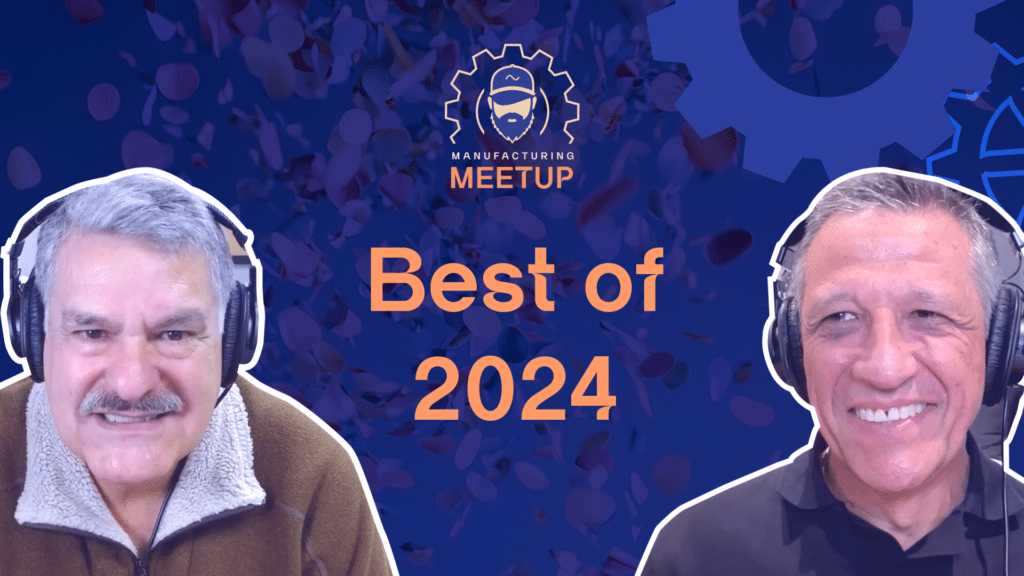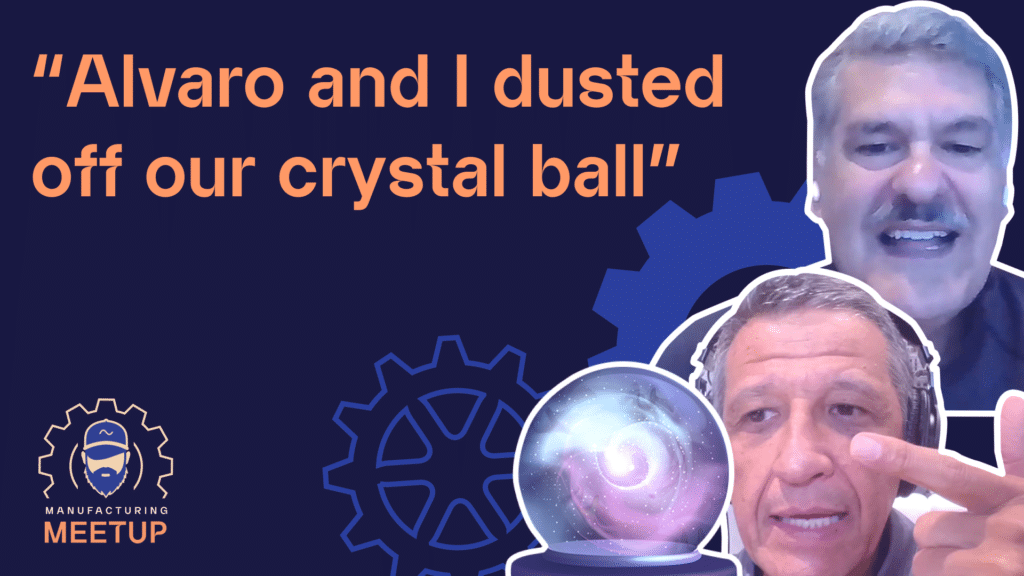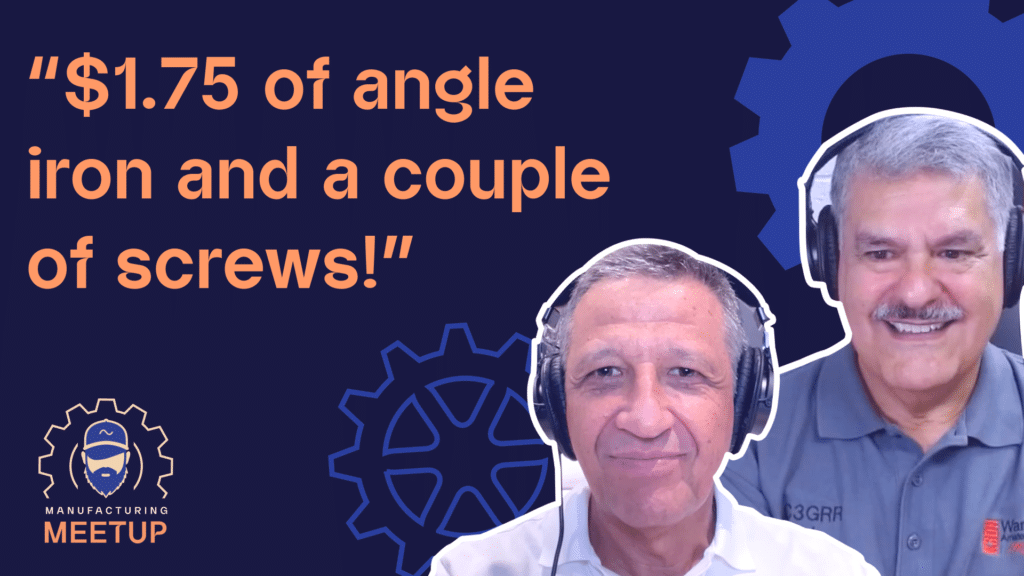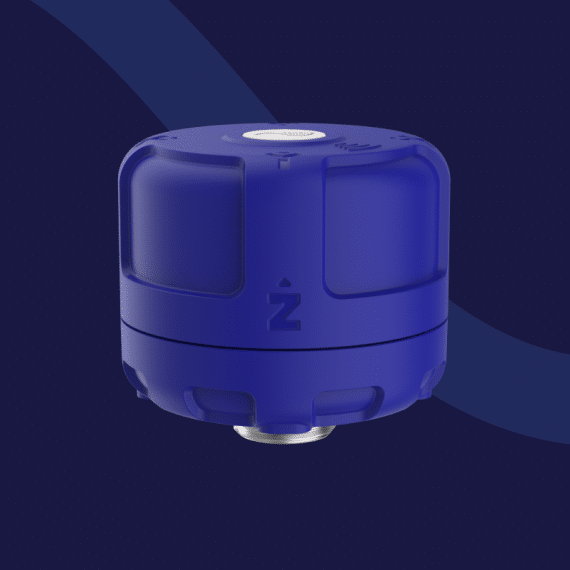The rise of “new-collar” jobs and top plant tour tips
In this episode, Alvaro and Ed consider the evolution of blue-collar jobs to “new-collar” jobs, recognizing that Gen Z may not want or even need college when they can learn advanced skills that don’t require advanced college degrees.
They also discuss plant tours—what they’re looking for and what they don’t want to see (spoiler alert: Ed really isn’t into wet paint). Additionally, Ed covers the perils of discussing business in a bathroom stall.
To keep the conversation going:
Email us: mmu@augury.com
Find us on The Endpoint: endpoint.augury.com
Full Transcript
Ed Ballina
Hi, I’m Ed Ballina
Alvaro Cuba
Hello, I’m Alvaro Cuba.
Ed Ballina
So we’re your manufacturing buddies, right? And we’re going to talk a little bit about what happened during the week. And Alvaro, how was your week? How did that go?
Alvaro Cuba
Well, it was a busy week. At the beginning of the week, we were working on some strategy for manufacturing. It’s always great to work on a strategy, thinking long-term about where you are and where you want to be, your operational excellence, and how to get there and do the structure capabilities and all that. So I love that kind of work. So it was nice. And at the end of the week,
Ed Ballina
Yes.
Alvaro Cuba
It was very busy because we had this weekend here in Miami, the Formula One race, and we had the game with Messi and the Inter Miami, 6 -1 guys. Goal from Messi and five assists. So very happy for soccer.
Ed Ballina
Hey! Oh, it sounds like a very, very full week, weekend in Miami, that’s for sure. I’m sure it had an amazing impact on the traffic. That’s already a lot of fun in Miami. But…
Alvaro Cuba
Yes, it does. But on the flip side, it’s great to have those events that you can participate.
Ed Ballina
Oh, no, that is a fact. Sometimes, you know, I live out in the country and I’m about two and a half hours from either New York or Philly. But, you know, sometimes we have to travel for stuff and there are times where I wonder, wow, I wish we were closer. But, so my week was really punctuated by an article that I saw on LinkedIn where PepsiCo awarded their Chairman’s Award. Now that is the highest award that you can get, the most prestigious I should say, you can get as a PepsiCo employee. And I was thrilled to see that a lot of my friends from my time down in the South Division won the Chairman’s Award because of their work with Adelante. So Adelante is the Latino ERG at PepsiCo. I was a proud contributor when I was down in Florida. At that point in time, I know we’re doing book bag drives and training, et cetera. Well, the team, the South Division Adelante ERG team was honored with the Chairman’s Award this week in New York. And so first of all, shout out to them. You guys have just done amazing work. You’re really great people.
And a real special mention to my hermano Mike Ortega. Mike has been a key member of that group for well over a decade and just about as long as I’ve known him. So congratulations on the Chairman’s Award. And because of that, I wore my Adelante shirt. So.
Alvaro Cuba
Congratulations, Adelante team. Keep it up. Great job.
Ed Ballina
So we’ve kind of caught up on the week. Now it’s time for us to welcome you to the Manufacturing Meetup Podcast, the show where we kick back and we talk about our great experiences on the shop floor, in the factories. And if it was a really bad day, we may trade beer for coffee, only once in a while. So join us.
INTRO BUMPER
Alvaro Cuba
Well, on the news side, this week I was reading and the headline caught my attention. It was Gen Z becoming the two-belt generation. And actually it triggered another thing that I was reading some time ago about a new “collar.” We talk about blue-collar and white-collar. And I read about this new collar, which I think was used first by IBM when they were working on their cyber security. And it’s basically about specialized skills, but they don’t require college education, which it fits perfectly on the Gen Zs, because they are excited about robotics and high tech and computers and all that, but not necessarily…are up to three, four, five years of college. So they are jumping into these technical skills. And I was part of the article was saying that, for instance, the American Welding Association was seeing that full enrollment in all the technical schools, and that the enrollment and the applications has gone up five times in the last five years. No?
Ed Ballina
That’s fantastic. I actually have, I’m really, I’m very close to this because my two GMs, my, which, you know, are my two sons, neither one of them went to college. For me, that was a struggle, right? However, one became an aircraft mechanic, AMP certified, worked for Delta Airlines, got promoted into management, did very well for himself before I pulled him in this business.
My other GM David, also no college degree, came up through the ranks of Pepsi and maintenance, got deep into technology, was running a couple of Hotfill Gatorade lines. And again, no college degree, but they both had deep technical skills. The third example I’m going to use is my nephew, Dominic Navarro. You mentioned welder. Well, Dominic is one of those guys you see
50 foot up in the air, welding I -beams and all that. He is a steel worker, union welder, and he makes a really good income and rival probably some middle-level executive wages, right? It’s hard work, right? But I think we’re witnessing a renaissance of not only American manufacturers, which we’re going to talk about in a little bit, but also the shifting of the skills of the workforce. And the old story, you have to go to college to be successful. My goodness. When I read, I saw a book that said, what was it? “My plumber drives a Ferrari,” right? If you’ve ever had any plumbing work done, I mean, Lamborghini, Ferrari, and forget electrical work. So absolutely, it is a different, it’s a change.
Alvaro Cuba
And the great news is now we have an entire generation that is thinking that way and they are having this as a prime job. So guys, it’s time to go after those guys and bring them to the plants. I’m sure it’s going to be a great influx of talent.
Ed Ballina
And also I think there’s a growing recognition that a college education has to have some rate of return, right? As the price of an education has skyrocketed, right? Some folks spending $200,000 to get a four-year college degree, you know, to go into a $45,000 a year entry-level job, the math doesn’t work unless you really zoom up the ladder. And I think there are people who are saying, hey, you know what?
Two year technical college, I come out with a skill, a specialized skill. I may start out making 80, 90 grand a year with quick ascension, so.
Alvaro Cuba
And close to their expertise. No, no, it’s nothing that they are being told. It’s something they are choosing.
Ed Ballina
Exactly. I came across a piece, and it’s funny because I think they all form a bit of a theme. There was a story in Bloomberg where they talked about growth in the manufacturing sector, the highest it’s ever been since June of 2022. And okay, I’m not going to get overly enthusiastic about, you know, a one-year, two-year trend, but, everything else makes sense, right? The environment is right. We talked about, you know, insourcing and, and, and reversing offshoring and onshoring. I think we’re starting to see that. Uh, you had called this out in our previous conversation, right? That, that it was out there in the horizon. I think we’re starting to see elements of that. Um, so, uh, you know, all this stuff comes together. American manufacturing is adding jobs. We’re, you know, we’re upgrading and by the way, our younger generation is starting to recognize that having a technical skill can actually benefit them and give them a better life than, you know, potentially some four-year college degree.
Alvaro Cuba
Adding a couple of numbers to that, the ING published a forecast of 1.5 growth for this year and 3% back into the 3% for 2025, which is a great story because we haven’t seen it since 2019. So I think all adds up to your point about manufacturing, I think the companies are taking the lead into that. They are seeing this growth and I was reading investment this week, some big investments on manufacturing for clean energy. Couple examples, Kraft Heinz announced 170 million to put in 10 plants, manufacturing plants. I also read
Ed Ballina
That’s a lot of ketchup.
Alvaro Cuba
Yeah, it’s a lot of ketchup and also thinking future, no? Now everything is going electric or…
clean, those are the words that are in everybody’s mouth these days. Unilever also announced $20 million for four manufacturing plants. But what I was reflecting is, yeah, the money is primarily for clean energy, but the important point here is not only for changing oil to electric or to wind or solar, but more important to reduce waste and to reduce the use of energy, which impacts quality, safety, cost, and all the other KPIs in a plant. So it’s not just for energy, but it’s how do we do an overall look and how we become more efficient so we can use less and that less, how we make it clean.
Ed Ballina
What’s what is neat about that aside from the fact that, you know, it’s the right thing to do right for our planet. You know, eventually we’re going to run out of fossil fuels or, you know, the cost of digging them out is going to become ever more expensive. And you know what employees buy into this, right? They actually feel first, they feel proud that the company is making the investment, but also they most people recognize this is a good thing and
I had a quick little example many, many moons ago when I ran the Pepsi Denver plant, I had the opportunity to visit Fat Tire Brewing Company, New Belgium Brewing Company, up in Fort Collins. They gave us a tour of the facility, and again, this is probably 20 years ago. But I kind of kept up with what the…
Alvaro Cuba
Touring a brewery should be interesting.
Ed Ballina
Oh, that was so cool. So cool. I love their beer. Fat Tire beer is one of my favorites if I’m drinking beer. But a few years later, the company proposed to their employees that if they were willing to forgo an annual wage increase, they would commit to purchasing all of their utilities from renewable sources. And guess what? They voted on it.
And the employees said, you know what, we’ll forgo our wage increases here so that we can invest those funds. Because back then, that source of energy was more expensive. Right. And like every P&L, right, you’re bringing costs. How are you going to offset that? And I thought that was really pretty cool. Right. The employees believed in it so much that they were willing to make that investment.
Alvaro Cuba
Yeah. And they understand that clean energy comes with good change. And the good change is for them at the end, no? Working in a plant that is more efficient, more modern, uses is at the forefront of technology, not only proud, but also a lot of personal benefits.
Ed Ballina
Agree. Now, to put it in context, right? And again, this was 20 years ago. I was in Denver 2001 through 2004, roughly. They were also the company that after you spent a year with them, they gave you a fat tire bicycle as an employee. And they had an onsite bicycle mechanic and shop that would maintain your bicycle for you. They had a parking space for bicycles.
And if you rode your bike to work x percent of the time, you got some sort of an additional bonus. So frankly, they had created an environment where such things, you know, were commonplace, right? So it’s not a big leap then to say, okay, you guys are doing that for us and this is part of your message. We’ll forgo our wage increases here because we believe in this and we believe in you. So a very cool place.
Alvaro Cuba
I had a similar experience, but in an European office where they did the layout of the office and every desk had a small space to the side to put the bicycle. So everyone could go to the office in the bicycle, put it besides them and keep it safe and everything. And it was a great pride of them because they were in the other side leading the way. So.
Ed Ballina
Yeah, all these things matter. So kind of just the last piece for me on the news, which is just a takeoff on what you just said. I had read another article where the investment in capital assets and equipment is also improving, right? So it all makes sense, right? You’re hearing manufacturers getting better now. You know, the workforce, I think, is starting to morph to people that have more skills that we need in manufacturing.
And now you hear the companies are also making investments like the one you talked about, but overall you’re seeing, which to me is, you know, it’s a sign of confidence, right? That you don’t invest a lot of capital when you think your business is going to be a challenge over time. So, it’s very encouraging stuff.
Alvaro Cuba
Yeah, I think we are entering a positive cycle and after five years starting with the pandemic, I think it’s about time. So guys, you are hearing us. I think there is light at the end of the tunnel. So let’s go for it. Let’s stay focused. And I think with technology, this new generation and these investments, we are going to see very good things in the hopefully in the near future.
Ed Ballina
And, you know, frankly, keep some of the money here in the US, right? Help grow our economy, provide jobs for our young people. And we talk a lot about young people, but you know what? This is, these are also opportunities available, not just for young people, right? If you have a job where you think your job may wind up getting replaced by automation, right? Or a process change or design.
Ed Ballina
It’s never too late to gain additional skills. You know, there are programs that are offered. Community colleges even have night classes or classes are specific to PLC programming, right? Just as an example. I mean, I don’t think, a PLC programmer is worth their weight in gold, right? Those folks make a ton of money. And it’s a skill. It’s hard, right? But you don’t need…a four-year college degree in electrical engineering to learn how to program PLCs and they are everywhere in our line. So if you’re mid-career and either you’re not happy with what you’re doing or you see that your role may wind up get changed by, you know, wacky the robot. Hey, think about changing what you’re doing, right? Study electricity, licensed electricians, like make a lot of money.
Alvaro Cuba
Yeah. And manufacturing in general, no? So maintenance and welding and machinists and all of that. And I think one of the silver linings of the pandemic has been that back in America again, no? For production after all the disruptions in supply chain and all that. So, yeah, it’s a great call to… We talk about…doing marketing for manufacturing. So here we are guys. Manufacturing is looking good. Yes, come. Yes, come to us. Okay. I think that with that, we can go to the topic of today, which is plant tours. And yeah, I see your face. So go for it.
Ed Ballina
Oh my God. So this, we could literally do four podcasts on plant tours, right? Being, I’ve been on the receiving end, right? As a plant manager, you’d get a lot of tours, especially, you know, if you’re in a facility that’s either in trouble or sometimes a desirable location that people want to travel to, right? But they were nerve-wracking for me, right?
You would do all the pre-work. You think your stuff is wired. You know, your plant staff is, you know, is ready for it. And the night before this, it, no matter how hard I tried, right? I, I, I’m a, I’m a night owl. I usually don’t go to bed till, you know, like 11:30. And then I read for half an hour. Um, I would go to bed at 9:30, force myself, right? And okay. I suddenly go to sleep two o ‘clock in the morning up, right? Like. Oh my God, too late to go try to go back to sleep. My brain is running with stuff. So then you run into the plant at a time.
Alvaro Cuba
You were hoping Murphy doesn’t… Yeah.
Ed Ballina
It doesn’t show up, right? We just do a batch. Oh, we just, you know, had this breakdown. But at the time where you need to be at your best, right? And you need to be sharp and answer questions. You are fuzzy, right? You’re tired. You didn’t get a full night’s sleep. And I was like, why does this happen all the time? So I’ve also been on the flip side of it, right? Where you’re the one going into the facility for the tour. And since you’ve walked in those shoes, you know, you try to be, like respectful, you’re not gonna like go deep diving in their sewers and all that, although I have done that once. But so we’re gonna tell you about some of our experiences and stuff and some things to think about. So when an executive walks into your facility, right, they know that what they are seeing is the best this place has looked in months, if not years, depending on when their last tour was right. So, as you’re walking around, right? Now, most places will tell you, oh, we’re tour-ready all the time. Okay. Yeah, I’m sure. Maybe about 20% of you are really tour-ready all the time. I know. You know why? I can still smell the wet paint. Okay. And we’ll talk about that in a little bit. But, so when I went through our facility, and I see, listen, everybody’s going to have a little issue here and there, you know, a spot that ain’t probably clean or…but if I see something that’s really, really challenging, I think to myself, and this is the best this place has looked, right? When I’m not coming to see this, it’s, I’m afraid now. I get afraid, right? We are, you know, we’re in a professional environment and I’m looking at things that shouldn’t be that way. That scares me. So if your facility is looking tired, right? Worn, in poor upkeep.
It’s probably worse when you don’t have a tour.
Alvaro Cuba
Yeah, well, I echo that. I toured plants from Toyota or Procter or plants that are already TPM level two, three, and it’s exactly what you’re saying. So it’s tour-ready all the time, no? And you can see it. Not all the plants are like that, but as far as you are on the journey, you recognize where you are, and you are open about it, and on the journey, it’s fine. Nothing is…is perfect, but the idea is not to hide, just to show and use it as an experience. They asked me several times, when you visit a plant, what are you looking for? If you are doing an inspection, what do you see? What’s your focus when you are doing the tour? And my answer, always is the people. I’m believer, believer that people is what matters. People is the one who makes things happen. And if you go into a plant and you see people smiling, agile, moving here and there, caring, you see they are caring for their equipment, they are caring for their surroundings. That tells…without seeing any KPIs or anything, that the culture, the management, the processes are working. Or if they are not there yet, sorry.
Ed Ballina
No, I was gonna say, you can feel it. Okay, I can’t describe this to you, right? And you know what I’m talking about. You walk into a plant, right? You walk into that shop floor and you can just tell if the place is winning, right? There’s an energy, right? There’s an aura. I’m maybe getting a little soft here, but you can feel it. And if the plant is in bad shape, right? And they’re struggling, and they’re failing. You can see the face of failure on your employees’ faces, right? It’s there. It’s written all over them. It’s the old Hotel California thing. So yeah, people, it’s like a billboard, right?
Alvaro Cuba
Yeah, I have seen both sides, no? And one, when the operators are the slaves of the machines and they are running and they are like crazy. And on the other hand, I always remember this visit in this Mexico plant gum line, and the people came to me, the operators, the mechanic, they came to me, they almost…rushed me into a room, show me the charts and all that. And then we went to the line and it was spotless. And they were showing me the parts that they helped to restructure or change for the line to run even better than what the manufacturer intended.
And it was this pride and this energy and all that. And I always, I go to the plant. If people are going that direction, it’s a plant that is moving into the right direction. Otherwise, it’s a plant that needs help.
Ed Ballina
Yeah, I agreed. Not and we’ll talk. I’ll talk a little bit more about that. But going back to the wet paint thing. OK, so listen, team, don’t paint that day. I know you all paint. I know you clean. I know you organize your on your best behavior. But wait, don’t paint the day before I show up, because truly I can smell it when I walk in the plants. Right. And everything’s bright and shiny. And whatever you do, take down the wet paint signs. They’re a dead giveaway.
And never ever have wet paint on your stuff, okay? If I get that yellow bollard wet paint on my shirt, I’m not gonna be a happy camper. You just ruined a nice shirt. So watch out for your wet paint. The key takeaway is be ready, right? And the visit doesn’t start inside your facility. The visit starts in your parking lot, okay? If your parking lot is messy, if there’s trash everywhere,
If you’ve had esoteric items hanging off your trees, that first impression is going to be, is something you’re going to have to overcome. Don’t do that. It’s too easy. Okay. Take care of the first things people see are incredibly important.
Alvaro Cuba
I had very early on in my career, I think it probably was the first or second visit that we received. The president of the region came and obviously we had our tour path and everything organized and ready. And when we were just going into the plant, then he stops and said, you know, before starting here, let’s go through the restrooms, lockers, and the cafeteria. And we were not that bad. So it was not a terrible thing that happened that day. So we passed. But the lesson for me was exactly what you were talking about. So those are the important things. It’s like when you go to a restaurant. And nowadays the restaurants there are…the modern restaurants, they have the kitchen open and you can see the kitchen. If you are going to see the kitchen dirty or the chefs running around and messing, probably you will turn around and go to another restaurant. No, not eat there. Well, exactly the same happens in the plants. If those things work and the people is taking care and…then most probably the rest of the visit will go nicely. Yeah.
Ed Ballina
I agree. Hey, bathrooms are killers, man. You know, first of all, there’s a time. Oh, yeah, I wasn’t going to but okay, so bathrooms, bathrooms are dangerous. So I was, I was visiting actually a pretty good facility always. They really were always tour ready. Their financials might have been a little touchy at times, but
Alvaro Cuba
You have a great story on bathroom, so why don’t you share it? No, no, share it, come on.
Ed Ballina
What a great people developer I had in that plant. Mark Hesselbacher, I want to name him, he passed away at the beginning of the year, but the best developer of talent ever. And I usually, the way I do my tours, we’ll sit in a conference room, we’ll do soup to nuts, KPI review. I usually like to hold a round table with the shop floor. I get out on the floor, walk around, right? But it is a little bit of a… of a review, right? And sometimes, you know, your numbers aren’t great. And sometimes, you know, there’s challenges. So, and you always do your homework ahead of time. So I kind of, I kind of knew where, you know, where the ugly stuff was. They had a waste problem. And I just didn’t feel like the time was right when we were talking the quality to dive into that. So we go through all the training, and I usually, at the end, when we do the closeout, I’ll spend half an hour kind of hey, you know, here’s some feedback some things to work on, some strengths, some opportunity areas, and most important always, always leave them with hope. No matter how bad that plant is no matter how bad the plant tour is. No matter that you found a hundred things that really made you go: What is going on here? The worst thing you can do is leave a plant with a defeatist mentality.
Give them hope. So the bathroom story, we cut, we’re almost at the end of my, of my, my, my ending and we have a bathroom break. I happened to be in the restroom and I hear the production manager and the QC manager come in. They did not see me, and I hear them chit-chatting next to each other. They’re like, Hey, you see that? Yeah. He didn’t figure out the waste stuff. Oh man. Good. I didn’t want to talk about that. Now.
I’m sitting in a booth listening to this, trying to contain myself from just cracking up, right? So they have no idea I’m there. They do their thing. They wash their hands. They go outside. I’m there doubled over, right? Laughing. So I walk in the conference room. We’re all gathered together. I say a few more things. And then I did; I dated myself, but you know the show Columbo, right? Where he was like just the disheveled detective that looked like he didn’t know what he was talking about. And he would always say, I’m not really smart, right? Now, he was brilliant, right? So I’m sitting there and I’m like, all right guys, hey, that’s okay. Hold on a second. Can we go back to the quality tab for a second? And all of a sudden, there was this look in the room like, oh, I said, listen, I know you have a problem. I know, no, I didn’t go quite that fast. I played the fish a little longer. I said, listen, you guys have a problem. Yeah, yeah, a little suffer. I said, we got it. We got to talk about this. You know, we have some, I have some ideas. That’s just gonna.
Alvaro Cuba
I was in the bathroom.
You made it suffer a little bit more.
Ed Ballina
And oh, by the way, here’s a coachable moment for you. Always check to see who’s in the stalls. Gentlemen. And I looked at the production manager, the QC manager, looked at each other like, I said, I heard you, and no, you didn’t get away with it. I was just waiting my time. They were like,
Alvaro Cuba
I thought the feedback was going to be – fix your quality, fix your waste problem.
Ed Ballina
Well, I hit him with that, but then I said, for career advice, always check the stalls because you never know who’s hearing your conversation. And you know what? It was a great way to end that because it was mostly a real positive tour. And they kind of knew my personality, and they know that I like to joke around. And we ended with that. They were rolling on the floor. And the plant director was like, you rookies, you didn’t check the stall. You could have looked. Anyway.
One last point that I wanted to make on this, this whole tour thing is I’ve seen people get themselves in real trouble because they think they can BS the person that the executive that’s in the tour. Okay. Uh, and sometimes you can get away with it, frankly, depends on the level of knowledge of the person that’s in your facility. But most of the time the people that come into your plants have had your job before. Right. We have tried to play tricks. Yes. We’re not beyond that. Right.
Try to change the scale of the graph so your numbers don’t look quite as bad or whatever, but that rarely goes well. Every plant is going to have its strengths and its opportunities, right? Own it, right? Don’t try to step away from the tough story. It’s okay. We all have tough stories and a good leader will recognize, okay, you guys know the first step to fixing a problem is knowing you have one. So fix the problem.
Own up to it. The executive may even decide, Hey, here’s some things that work for me, or you need extra help. Let me get engineering in here. Okay. Don’t try to BS; that never ends well.
Alvaro Cuba
Actually, for me, every plant visit, it’s an opportunity. And it’s a double opportunity, actually, because if you take it with the spirit that you are describing, this is not about impressing, never paint. Just go for it. If you have a problem, be upfront about it. Just explain what are you doing for it. But once that happens, you establish some trust between the visitor and you guys in the plant. Once that is established, there is a great opportunity of exchange, both ways. Because if you have important visitors, the president of the region, executives, this is the time where you and your people can show them the good things that you have done, the needs that you have, what are your biggest challenges? You can ask them how they can help. So it becomes also an opportunity to get that help. And equally, it’s an opportunity to educate the people that are coming to your facility. If you are having an issue or you’re trying to transmit some message, it’s an excellent opportunity.
I seen once, I took the board of directors to one of our plants, and the entire board of directors, we flew them, took them to the plant, and took them to this line, chocolate line. And they were presenting, and yeah, they showed some of the good stuff. They showed some of the parts that they were still working on.
They asked for things, and they answered the questions very open, back and forth. When we left the facility, the feedback from the board was, okay, that plant is great; look that, we need to find the way to help them in this way, in that way. And it became really very, very helpful, not only for that plant, but for the entire manufacturing area in the region. So, and I always, you already mentioned, no, but I always had the same custom, no? Go when you are in the plant, you do kind of small fireside chat, no? Where everyone asks you things and you also have the opportunity to ask things and that establish also a nice rapport.
Ed Ballina
You develop and you develop relationships with these people. I, one of the most rewarding parts of, of, of what I do when I go into a Pepsi plant that I had a history with, right, is walking out on that floor. My, the first plants that I walked into after being away for five years, I was a little heartbroken because I only knew the plant director. I did not know anybody else in management. But you know what?
When I stepped down on that floor and one of the mechanics on the can line, Coop, saw me from afar, “Ed Ballina, what are you doing here?” Right. And he gave me a big hug. Right. Oh my God, did that feel good? Right. I was teaching a class in Denver, Bottle Line University, and we had a big open conference room and one of the operators walked by and he saw me teaching. He did a double take like, look at me. Ed Ballina. So in the middle of class, he walks in, hey man. Oh.
And that’s a result of some of these tours and the relationship building that you do. And I’m sure you, like I. No, not so much. I just been to a lot of plants. And here I go, likewise. Oh.
Alvaro Cuba
I can relate to that. Ed Ballina is famous, so…I can, and he’s my friend, he’s my amigo. He’s my amigo. Well, guys, we really wanted to have this plant tour discussion because we had different questions about what you do when you go to a plant or what things we need to be careful or how we should prepare. I think quick takeaways of this is the best thing is don’t prepare for a tour. Just do what you do. Prepare every day for the day-to-day. That’s first. Second, it’s a great opportunity. Visits well planned, establish good relations, and it’s a great opportunity to sell, to educate, to get the help that one needs.
And probably the last is people that go to the plant want honesty in what you hear is what you see. So it doesn’t make sense to paint here if you are going to see product following of the line. And people that go to our plants normally have gone, I said, I was saying to several plants and they know. So when you are seeing…a safety problem and then you see a graphic saying, oh, great safety. You know, something is not going well. So yeah, what you see is what you hear. That’s the idea.
Ed Ballina
Yeah, something’s, if it doesn’t make sense, something smells, right? If you get a story in the conference room and what you physically see out on the shop floor… my biggest disappointment, I guess, is in places where they show me they have 99% PM completion and their numbers are running at 50% efficiency. Something doesn’t quite match. But they are terrific opportunities, as Alvaro has said.
Um, the, and it’s necessary. It’s part of the job. What I’ve seen plants do very well, um, when they’re not tour ready all the time, Alvaro, is when they invest the money in the time to raise the standard of the facility, what I would say to them is now don’t give it up, right? You’re not all the way to bright. You have a lot of work to do. You took, you took this one area and you took it all the way back. That is your beachhead. Hold on to that and now build upon that.
And over the course of five years, some of this investment can help the plant really become what their true potential is. So.
Alvaro Cuba
And if it’s not the right time for a visit, say it like it is. It’s not the right time. We are working on it and promise a further, another date and get ready, but in the right way. So guys, with that, we wrap up the episode for today. Thank you very much for joining our Manufacturing Meet Up
It’s always a pleasure for Ed and me to share this with you and we would like in the future to get much more interaction and be able to talk about the things that really matter to you. So let us know, and if you enjoy this episode, please subscribe, like us in YouTube, or give us a review on iTunes. And the best way is share the podcast with your friends and others. We want in the coffee shop or in the bar, we want it to be full of buddies. So come and join us.
Ed Ballina
We want our buddies; we want “no vacancy” hanging out outside the virtual establishment here. So, if you want to keep this conversation going, you can email us at mmu@augury.com or you can find us on The Endpoint, which is a free online community for manufacturing pros. That’s at endpoint.augury.com.
We’ll also have those links in the show notes for this episode. So see you next time manufacturing buddy.
Meet Our Hosts

Alvaro Cuba
Alvaro Cuba has more than 35 years of experience in a variety of leadership roles in operations and supply chain as well as tenure in commercial and general management for the consumer products goods, textile, automotive, electronics and internet industries. His professional career has taken him to more than 70 countries, enabling him to bring a global business view to any conversation. Today, Alvaro is a strategic business consultant and advisor in operations and supply chain, helping advance start-ups in the AI and advanced manufacturing space.

Ed Ballina
Ed Ballina was formerly the VP of Manufacturing and Warehousing at PepsiCo, with 36 years of experience in manufacturing and reliability across three CPG Fortune 50 companies in the beverage and paper industries. He previously led a team focused on improving equipment RE/TE performance and reducing maintenance costs while improving field capability. Recently, Ed started his own supply chain consulting practice focusing on Supply Chain operational consulting and equipment rebuild services for the beverage industry.






